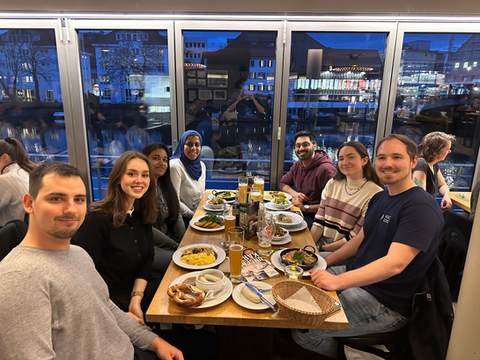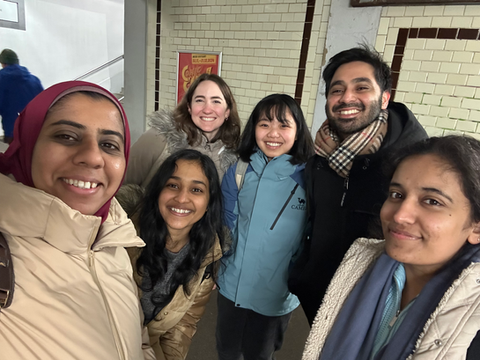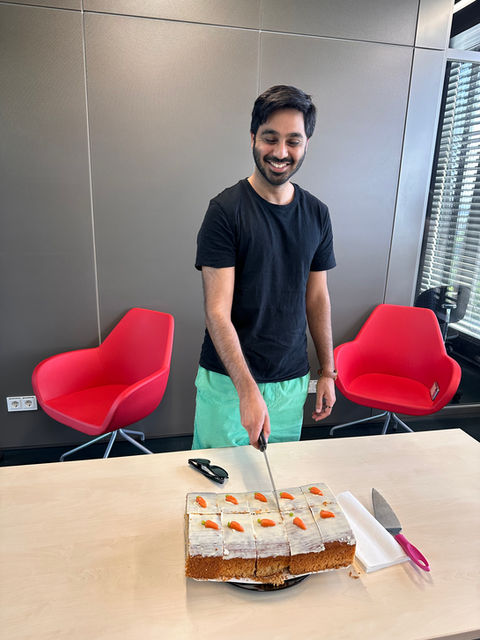
Cell mechanics and neurodegeneration lab
News




































Research Topics
Our lab is based at the Interfaculty Institute for Biochemistry (IFIB) at the University of Tübingen in Germany.
We are interested in neuronal cell biology, with an emphasis on the cytoskeleton-membrane interactions in neurodegenerative diseases such as Alzheimer's and Parkinson's.
Brain cilia-synapse interface
Primary cilia, microtubule-based projections present on most cell types, are also found on nearly every neuron, though their role in the brain remains an enigma. Why do neurons retain these solitary structures? Could they detect unique chemical cues via non-canonical receptors, or sense mechanical forces to influence neural communication? Our lab investigates these questions to uncover a new layer of brain signaling in both health and disease.

Schematic diagram summarizing the impact of Parkinsonism synaptojanin-1 mutant on calcium channels in primary cilia of iPSC-derived dopaminergic neurons (Rafiq et al 2024, Volos et al 2025).

We used a previously described synaptic vesicle-like reconstitution system in fibroblast to model the different secretory vesicle pools of iPSC-derived dopaminergic neurons. Dopamine-containing vesicles are strikingly larger than the glutamate-containing counterparts. These findings may have implications in understanding non-classical synapses, and the preferential vulnerability of dopaminergic synapses in Parkinson’s disease (Fujise et al 2025, Choi et al 2024). We hope to build bottom-up approaches to link cilia-mediated synapse regulation!
Microtubule mechanics in neurodegeneration
While early-onset forms of Alzheimer’s and Parkinson’s diseases have been linked to specific genetic mutations, over 90% of cases are late-onset and lack a clear genetic cause.
This raises the question: how do known genetic factors relate to the unidentified triggers of late-onset disease? Our research explores how non-genetic factors, such as age-related physical stress, interact with cellular mechanisms, potentially destabilizing proteins like tau and contributing to neurodegeneration. By combining genetic insights with advanced biophysical approaches, we aim to uncover how mechanical and biochemical deficits intersect to drive disease progression.

Schematic diagram summarizing past and on-going works using iPSC-derived cortical neurons to elucidate the interplay between microtubule stress and tau dynamics (Mishra et al In prep, Rafiq et al 2022, Gowrishankar et al 2021).

We have previously described a role for bridging proteins (e.g. KANKs) in regulating cell adhesion turnover by connecting actomyosin-dependent contractility and microtubules (Rafiq et al 2019a, Rafiq et al 2019b). We are excited to explore these mechanisms, especially in the context of tau mechanics in neurons in the future!
The Team

Nisha Mohd Rafiq, PhD
Group Leader / Principal Investigator
Cell Mechanics & Neurodegeneration Lab
University of Tübingen
Postdoc - Neuroscience @ Yale University
PhD - Mechanobiology @ National University of Singapore & King's College London
Our lab is funded by:


PhD Students
Jaya Mishra
Karmali Nasser
Ladina Müller (with Philipp Kahle, HIH)
Postdocs
TBA
MSc Students
Marvin Adler (IFIB Biochemistry)
Ke Wang (Bioinformatics)
Zeynep Ayılmazdır (Erasmus student)
Lab Assistant
Barbara Birk
Alumni
Polina Volos (GTC Neuroscience, thesis project @Wyss Institute, Harvard University)
Alina Ziegler (IFIB Biochemistry)
Melissa Lang-Schnee (IFIB Biochemistry)
Anuskhka Dutta (IFIB Biochemistry, thesis project @Dept of cell biology, Harvard University)
Beyza Ileili (Erasmus student)
Makuan AbdelWahed (Bachelor student)
Institute and Tübingen

Interfaculty Institute for Biochemistry
Faculty of Mathematics and Sciences
University of Tübingen
Auf Der Morgenstelle 34
Tübingen, Germany 72076
Office: 4A36 (4th floor)
Lab: 5th floor
Contact us
Interested in joining the lab?
We value people from diverse backgrounds, regardless of race, religious beliefs, ethnic origins, gender identities, socioeconomic statuses and sexual orientations.
Scientifically, we welcome people with the following expertise: bioengineering, physics, computer science, cell biology and/or neuroscience to be part of our multidisciplinary environment. We are actively exchanging ideas with the local community and our international collaborators (Singapore, USA). We strongly encourage applications from abroad for our graduate and postgraduate positions.
Undergraduates, Masters and PhD
Please send me your CV with reference contact information. If you are currently a student in Tübingen, you can send me a quick email and we can have a chat at IFIB.
Postdocs
Please send me an email outlining your past work and future interests, together with your CV.





















